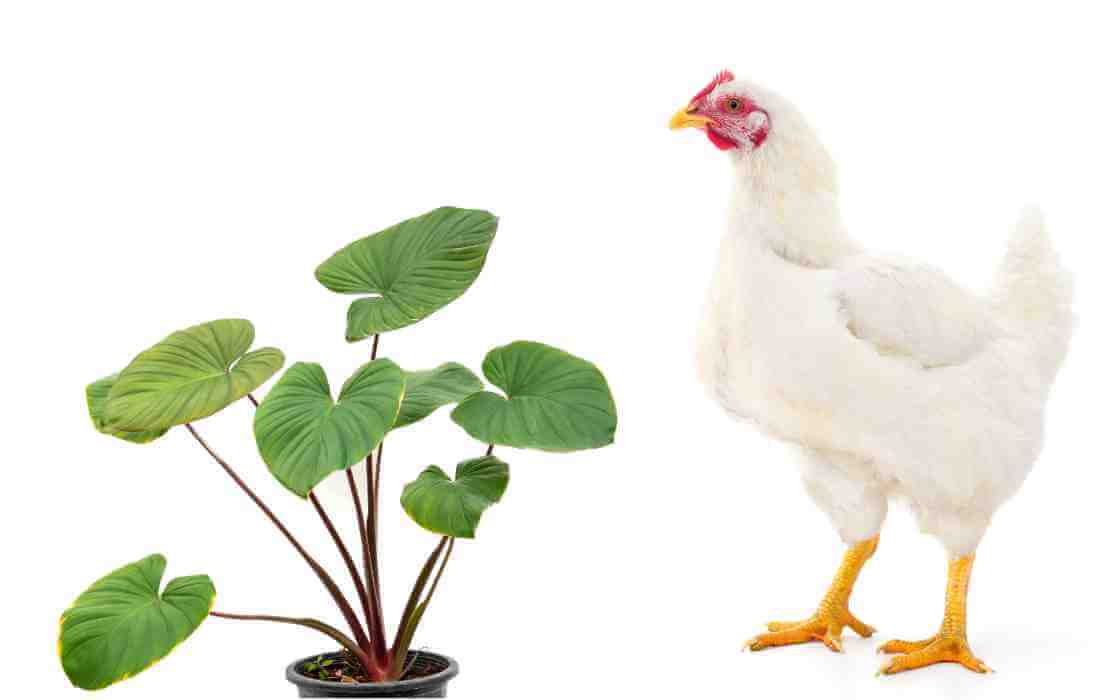People use many plants to decorate their landscape. In tropical climates, it’s very common to find the ornate elephant plant. This unfortunately, means it’s inevitable to be consumed by our pets if it’s around. Can chickens eat an elephant ear plant? What should you do if your chicken eats one?
Can Chickens Eat Elephant Ears
No, chickens cannot eat elephant ears. Elephant ears contain raphides, a toxin that is harmful if touched or consumed by any creature, including chickens. The leaves and stems are the most toxic part of the plant, and can cause severe side effects for chickens, children, and other pets.
What Are Elephant Ears

Elephant ears, or _Colocasia esculenta_, are long-stalked plants with velvety heart-shaped/arrow-shaped leaves.

These plants are an evergreen perennial and are native to southeast Asia and the Indian subcontinent but found in other tropical climates such as the southeast United States.
Because of the oversized leaves, they are commonly used as decorative plants for landscaping in gardens or yards, pools, walkways, and patio enclosures.
Why Elephant Ears Are Harmful To Chickens
According to PoultryDVM ‘s Toxic Plants Finder Tool, elephant ears’ heart-shaped leaves contain the toxins known as raphides. Raphides are extraordinarily tiny and needle-shaped. They are made up of calcium oxalate, which is also what makes up the most common form of kidney stones.
Other foods high in calcium oxalate are cranberries, beets, beer, beans, oranges, and dark greens such as spinach. These and other foods high in oxalate should be avoided or fed in small portions. Instead of giving your chickens spinach, consider feeding them kale, as it contains about 17 milligrams or oxalate, which is less than spinach.
When the plant fiber is damaged, the plant releases the needle-like raphides. The chickens will swallow these causing them to bury into the tissues inside their esophagus and stomach.
These raphides are the plant’s defensive mechanism and are made to cause intense pain and irritation to its predator’s throat to prevent it from being targeted as food again. If the raphides reach your chicken’s stomach, it will cause it to be irritated or upset, and your chicken will not want to eat any food.
Although the elephant ear plant is considered to have a toxicity level of 1 out of 10, it can still cause harm and pain to your chicken and should be avoided.
Can Chickens Eat Elephant Ear Plant Leaves or Stems?
According to PoultryHelp, the leaves and stems are toxic to chickens. It didn’t say anything about the bulbs or tubers, but it’s best to keep your chickens from eating any part of the plants.
If you have free range chickens, consider planting rosemary, sage, white clover and other plants that chickens love to eat and are safe.
Other plants that are toxic to chickens are azaleas, Ferns, Foxglove and etc.
Will Chickens Eat Elephant Ears?
Most people who own chickens and have elephant ears say their chickens are smart enough to know which plants are safe to eat and which are poisonous. Their ducks will eat the plants (without any issues), but their chickens scratch around them in search of bugs.
It’s best to keep young chicks away from elephant ears, as they are still learning which plants are toxic or not. One could accidentally peck the leaves or stems, which can be fatal.
How To Tell If A Chicken Ate Something Toxic
If you have elephant ears anywhere near your chickens, it’s essential to make sure they can’t eat them. It means removing the plant or fencing off the area so your chickens can’t get to them.
Consider growing smaller varieties in containers and hang them above the ground and out of reach from your chickens. Ensure you pick up any fallen leaves immediately!
Sometimes, however, one of your chickens may take a peck without you knowing. You should be able to tell if your chicken has eaten something they aren’t supposed to.
Symptoms of ingesting a toxin include intense pain, anxiety, difficulty swallowing, coughing, and loss of appetite. You might also notice a lack of energy or general unwellness in your chicken.
Symptoms of Elephant Ears
Elephant ears are not as toxic as Dieffenbachia, but they can be harmful to both pets and young children. The leaves and stems are the most poisonous part of the plants and cause irritation if touched or eaten.
Below are some of the symptoms associated when exposed to this plant:
- Diarrhea
- Vomiting (chickens can’t throw up, but they excrete fluid)
- Swelling of the eyes, tongue, and lips
- Severe burning of the mouth and tongue
What To Do If A Chicken Eats Elephant Ear Plants?
If you suspect your chicken has eaten an elephant ear or another toxic substance, you should immediately seek out the source and eliminate it. Removing the elephant ear plant or any other toxin ensures that your chicken will never be able to consume it again accidentally, and you won’t have to worry about any future incidents.
There is a natural remedy you can try before calling your veterinarian. You can try giving your chicken some water with Epsom salt to see if it will pass naturally on its own.
You can do this by mixing one teaspoon of Epsom salt in 1 cup of water and hand feeding your chicken with a syringe. Epsom salt is an FDA-approved laxative and is extremely effective for detoxing and clearing your chicken out.
However, if this appears to be ineffective within a few hours, and your chicken is still experiencing symptoms, you must seek professional medical help for your chicken.
Hobby Farms warns that no matter what your chicken has eaten, if it stops eating, drinking, eliminating, self isolates, becomes listless, or has a hard crop (located just to the side of the right breast muscle). It is crucial to call your veterinarian immediately to seek the best treatment option for your chicken.
Final Word
Chickens cannot, and should not, consume elephant ears. If you love elephant ear plants, then keep them out of reach from your chickens, children, and any other pets.
Elephant ears contain harmful toxins known as raphides that can cause intense pain and irritation to your chicken’s throat and/or stomach.
If you have elephant ears in your yard or anywhere near your chickens, the most effective way to prevent accidental consumption is to remove the plant altogether.
However, if you can’t do this, you can fence the plants, so your chickens cannot get near them. If you have free-range chickens that are continually eating your plants and flowers, consider growing plants that are safe for chickens.
If your chicken has consumed elephant ears and has symptoms, you should seek a veterinary opinion to find the right care option.